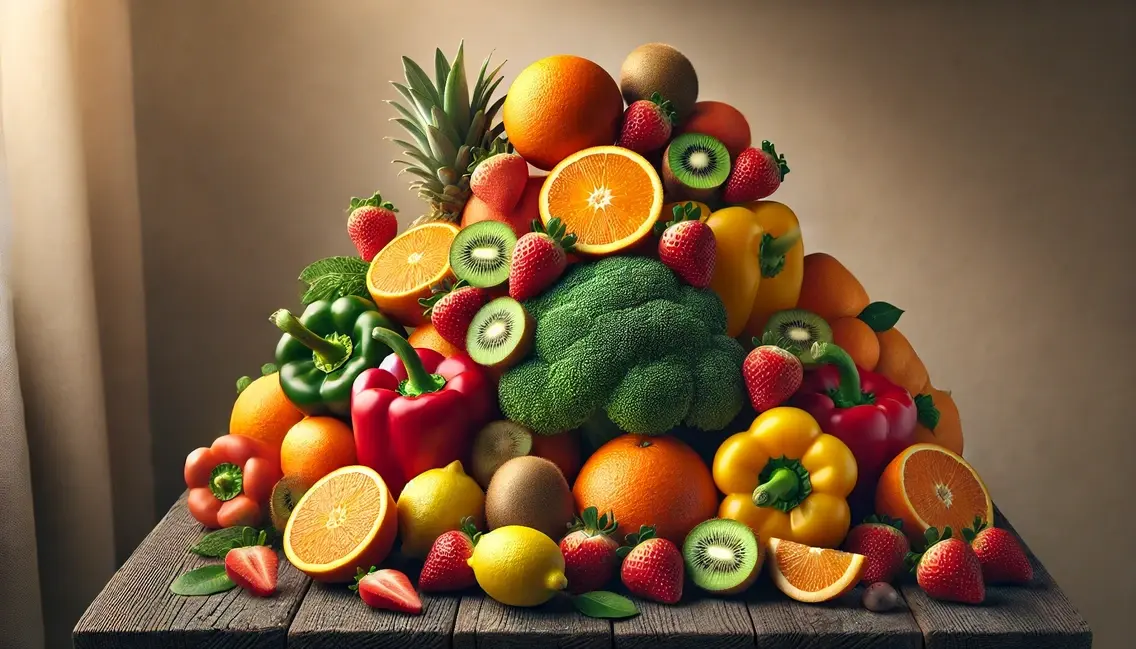
Vitamin C (Ascorbic Acid)
The Ultimate Vitamin C Revelation: What Your Body's Been Craving
Imagine a single vitamin capable of boosting your immune system, enhancing your skin’s glow, and speeding up your recovery, all with the power of nature. Welcome to the world of vitamin C, or as it’s scientifically known, ascorbic acid. This water-soluble powerhouse isn’t just something your parents told you to take when you caught a cold. It's an essential nutrient that your body counts on for countless vital functions.
From collagen production—which is key for maintaining youthful skin and promoting strong joint health—to iron absorption and preventing diseases like scurvy, vitamin C earns its status as a cornerstone of health. Yet, despite its crucial role, misconceptions about dosing and its effects still abound. For instance, while 90 mg for men and 75 mg for women is typically recommended daily, 1000 mg doses are usually harmless, though skyrocketing to even higher doses can lead to unwanted side effects.
So, what’s the best way to get your vitamin C fix? The vibrant world of citrus fruits, strawberries, and dark leafy greens offers a natural source, but for those looking to harness its full potential, supplements provide a reliable option. As the science unfolds, you might reconsider how this "classic" vitamin fits into your wellness regime. Stay tuned as we delve deeper into the essential secrets of vitamin C and explore how it can transform your wellbeing from the inside out.
Health Benefits of Vitamin C (Ascorbic Acid)
Vitamin C, or ascorbic acid, is a vital nutrient renowned for its numerous health benefits. As a water-soluble vitamin, it plays an essential role in supporting various bodily functions, including collagen production, antioxidant defense, and immune enhancement.
Key Health Benefits
- Enhances Collagen Synthesis
Vitamin C is crucial for the production of collagen, a protein necessary for the development and repair of tissues. Not only does it help maintain skin elasticity, but it also strengthens tendons, ligaments, and blood vessels, facilitating wound healing and overall tissue repair.
- Boosts Antioxidant Defense
As a potent antioxidant, Vitamin C protects cells from oxidative damage caused by free radicals. This defense reduces the risk of chronic illnesses, such as heart disease, and may decrease the likelihood of certain cancers, underpinning its importance in a balanced diet.
- Strengthens the Immune System
Maintaining adequate Vitamin C levels is key to a robust immune system. It enhances the performance of white blood cells, which are integral to combating infections and ensuring quicker recovery from illnesses, thereby bolstering general health.
- Improves Iron Absorption
Vitamin C also assists in promoting better iron absorption, specifically non-heme iron from plant foods. By converting this iron into a more absorbable form, it aids in preventing iron-deficiency anemia, enhancing energy levels and vitality.
Incorporating Vitamin C for Optimal Health
Given these significant health benefits, adequate Vitamin C intake is essential. A diet rich in natural sources of this vitamin is recommended for overall well-being. For an added boost, consider the convenience and flavor of supplements like Jamieson's Chewable Vitamin C 500 mg and Vitamin D3 500 IU, which not only supports immune and bone health but also delights your taste buds with a tangy Morello cherry flavour.
Dietary Sources of Vitamin C
Explore the top natural sources of Vitamin C, an essential nutrient known for its antioxidant properties and role in collagen synthesis. Incorporating a variety of these fruits and vegetables into your diet is essential for supporting your immune system and overall health.
Natural Sources of Vitamin C
- Citrus Fruits
Oranges, lemons, and grapefruits are renowned for their Vitamin C content. While they are quite effective in boosting immune function and maintaining skin health, obtaining sufficient Vitamin C through citrus fruits alone can be challenging due to seasonal limitations and varying freshness levels.
- Strawberries
As delicious as they are nutritious, strawberries pack a punch of Vitamin C along with antioxidants that combat free radical damage. However, not everyone consumes them regularly.
- Kiwis
One kiwi offers more than the daily recommended intake of Vitamin C, alongside fiber and other beneficial nutrients. Still, consuming kiwis daily isn't always practical for everyone due to cost and availability.
- Bell Peppers
Red and green bell peppers contain more Vitamin C compared to many fruits, easily complementing salads and stir-fries. Yet, ensuring a daily intake remains tough for those who prefer different vegetables.
- Dark Leafy Greens
Kale and spinach not only provide Vitamin C but also offer a wealth of other vital nutrients. Incorporating them into every meal, however, might feel restrictive and unappealing for some.
Overcoming Dietary Challenges
While natural sources are essential, maintaining a consistent supply of Vitamin C through diet alone can be difficult due to availability, dietary preferences, and meal planning limitations. For those who face these challenges, a convenient option is to supplement with products designed for easy consumption. Enjoy the tangy Morello cherry flavor while boosting your immune and bone health with Jamieson's Chewable Vitamin C 500 mg and Vitamin D3 500 IU! By supplementing, you can confidently meet your Vitamin C daily needs, supporting optimal health and wellness.
Next, let's review the daily recommended intake of Vitamin C and how both food sources and supplements together contribute to maintaining optimal health.
Daily Intake for Vitamin C
Vitamin C, or ascorbic acid, is vital for collagen synthesis, antioxidant defense, and enhancing immune function. Insufficient vitamin C intake can lead to scurvy, anemia, and delayed wound healing—so meeting your daily requirement is crucial to maintaining health.
Recommended Daily Intake
- 1-3 years: 15 mg per day
- 4-8 years: 25 mg per day
- 9-13 years: 45 mg per day
- 14-18 years (male): 75 mg per day
- 14-18 years (female): 65 mg per day
- Adults (male): 90 mg per day
- Adults (female): 75 mg per day
- Smokers: Additional 35 mg per day
- Pregnant women: 85 mg per day
- Breastfeeding women: 120 mg per day
Consistency in Daily Vitamin C Intake
To consistently meet your vitamin C needs, include a diverse range of fruits and vegetables like citrus fruits, strawberries, kiwis, and bell peppers in your diet daily. While dietary sources are the best, supplementation may sometimes be necessary. For those looking for a convenient option, consider Jamieson's Chewable Vitamin C 500 mg and Vitamin D3 500 IU, which combines immune-boosting properties with the delightful tang of Morello cherry flavor. Before beginning any supplement, consult a healthcare provider, especially if dealing with health challenges. Next, we'll explore the symptoms and steps to avert Vitamin C deficiency.
Deficiency of Vitamin C
Vitamin C deficiency—medically termed scurvy—poses significant health risks by impairing vital functions such as collagen synthesis, immune response, and tissue repair. The human body lacks the ability to produce Vitamin C independently, making it imperative to incorporate adequate amounts through diet to avert deficiency-related ailments.
Deficiency Symptoms and Consequences
- Scurvy
Scurvy represents the most severe form of Vitamin C deficiency, arising from disrupted collagen synthesis. Symptoms include bleeding gums, joint pain, and skin hemorrhages, and if left untreated, it can escalate to life-threatening conditions.
- Weak Immune Function
Insufficient Vitamin C compromises the immune system, heightening vulnerability to infections. This vitamin is crucial for the production and functioning of white blood cells, the defenders against potentially harmful organisms.
- Anemia
As Vitamin C facilitates the absorption of non-heme iron from plant sources, its lack can lead to anemia. This condition, marked by symptoms such as fatigue and weakness, results from inadequate iron absorption.
Preventing Vitamin C Deficiency
Guarding against Vitamin C deficiency is achievable through a diet abundant in citrus fruits, strawberries, bell peppers, and dark leafy greens. Embracing the tart and inviting Morello cherry flavor, boost your immune and bone health with Jamieson's Chewable Vitamin C 500 mg and Vitamin D3 500 IU—a practical step to ensure daily nutritional needs and ward off deficiency's grave implications.
To deepen your understanding and dispel common myths around Vitamin C, exploring our frequently asked questions could provide clarity on preventing deficiency in everyday life.
Conclusion
Vitamin C is far more than just a seasonal remedy or the vibrant appeal of an orange’s flesh. It's an everyday powerhouse, quietly working to keep our skin resilient, our immune defenses sharp, and our bodies recovering efficiently. Armed with this knowledge, it’s worth contemplating: Is your daily routine aligned with this powerful vitamin’s potential? Imagine embracing vitamin C not just as a supplement or a piece of fruit, but as a daily commitment to your long-term health and vitality.
So, what's your next move? Are you reaching for more citrus, considering a supplement, or planning a conversation about nutrition with your peers? The choice is yours, and every small decision lays the groundwork for a healthier tomorrow. We invite you to share your favorite vitamin C sources or experiences with integrating it into your life—because your success stories drive the community forward.
Dive into this world with intention and curiosity. Start with easy adjustments, like adding more fresh produce to your meals or discussing supplement options, if necessary. Remember, health is a journey built one beneficial habit at a time. Now, it's over to you: how will vitamin C fit into your narrative of wellness and vitality?

